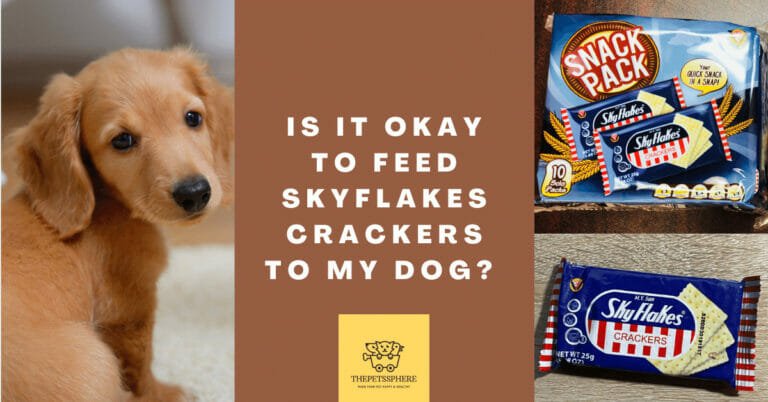Sometimes, a pack of Skyflakes with a ranch dipping is all you need on a tiring day. The crunch of these salty crackers, followed by the ranch’s creamy flavor, makes your whole existence dance. But you can’t ignore your favorite pup while enjoying your little snack. So, a question pops into your mind – can dogs eat Skyflakes crackers?
Can dogs eat Skyflakes?
Yes, dogs can eat a couple of Skyflakes crackers, but it should not be a regular thing. Human snacks like crackers provide no nutritional value for dogs. They should be treated as a once-in-a-while dog treat.
Skyflakes crackers come under the umbrella of Monde M.Y. San Biscuits Inc. The history of this company goes back to 1935 when it first originated in Manila, Philippines. Soon after its launch, Skyflakes crackers become a regular in Filipino households. Today, it is sold worldwide and may even be the most famous crackers of all time.
What’s in Skyflakes crackers?
Before you feed Skyflakes crackers to your dog, you should know the ingredients that make these crackers. Granted, you would never go to such lengths for yourself, but we need to be responsible for our precious dogs. Here’s a list of ingredients used to produce Skyflakes crackers and the nutritional value of one pack (32 crackers):
- Wheat flour
- Vegetable shortening (coconut and palm oil)
- Salt
- Sugar
- Sodium bicarbonate
- Yeast
| Calories | 120 |
| Saturated Fat | 4 g |
| Sodium | 110 mg |
| Potassium | 10 mg |
| Carbohydrates | 17 g |
| Protein | 3 g |
| Calcium | 6 mg |
| Iron | 1 mg |
Benefits vs. hazards of Skyflakes for dogs
Skyflakes crackers are pretty harmless for dogs if given in small quantities and not regularly. As you can see from the nutritional value table above, there is no healthy element in these crackers. They are literally empty calories that do nothing good to your dog.
That being said, the only time your dog will get sick after eating Skyflakes crackers is when it consumes a whole pack of crackers or if given daily. Human foods tend to mess up a dog’s digestive system because it is hard for them to digest the ingredients. There is a reason dog food is made specifically for dogs.
Let’s take a look at Skyflakes’ ingredients that can harm your dog:
Sodium
Crackers have a high amount of salts. Salts enhance the flavors and also preserves the crackers. One container of Skyflakes crackers contains 110 milligrams of sodium. That is more than what your dog should get in a day.
Usually, dogs can get their required amount of salts from their regular meals. Giving them extra sodium as a treat is like inviting unnecessary discomfort for your dog. High sodium levels can damage a dog’s liver, elevate heartbeat, cause diarrhea, and even cause death in rare cases.
Wheat flour
The kind of flour used to make these crackers is the most refined. It means that all the good nutrients of whole wheat are removed from it. Hence, this flour has no nutritional value for dogs.
On the other hand, flour contains gluten. Gluten and wheat allergy is common in dogs. Before feeding Skyflakes crackers to your dog, make sure that it does not have an allergy to any ingredients.
Related FAQs to dogs and Skyflakes
Can dogs eat unsalted crackers?
Unsalted crackers are a better option for dogs compared to regular crackers. Due to low sodium content, a dog can eat unsalted crackers without getting sick. But you should avoid giving even the unsalted ones to your dog every day.
Can dogs eat crackers with seeds?
Seeds like flaxseeds are good for dogs. They are a good source of fiber and healthy oils. Crackers with seeds are somewhat healthy, but they should not be given to dogs in large quantities. One or two occasionally is fine.
Conclusion
Skyflakes crackers may be the top-rated crackers for humans. They could also be your dog’s favorite treat. However, as a responsible pet owner, you should control the number of Skyflakes crackers your dog eats. While one or two once a week is okay, eating Skyflakes crackers regularly can adversely affect your dog.

